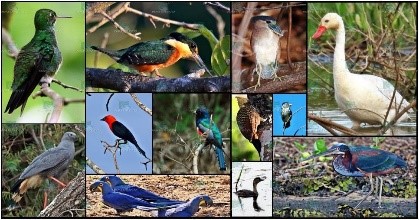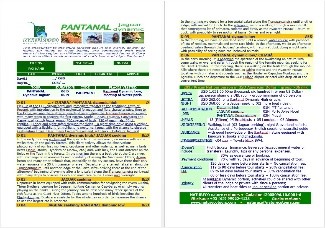Contact Us
And be ready for yout next safari
Frequently Asked Questions
Pantanal can be visited throughout the year, provided that flexibility is in the itineraries, going to the appropriate place for each season, considering the migratory movement of animals in search or moving away from the waters.
North and South is only a political differentiation, considering the entrance gates – the capitals of the two states (Mato Grosso and Mato Grosso do Sul) – , because the slope of the land is more pronounced from Northeast to Southwest. What happens is that at the same time, each of the 11 different Pantanais is living a different season.
We recommend a minimum of 5 years old, so that the child has some advantage of the trip.
Prefer lightweight, light-colored cotton fabrics to cope with the heat and not allow mosquitoes to reach your skin. Avoid the colors red, yellow and black. Long pants inside the socks when walking in the woods prevents ticks. Straw hats sold in Poconé are great allies, as they provide shoulder-length shade and allow ventilation.
Yes, of course, we will be happy to forward to the lodges your requests regarding meals. As for allergies, tell your doctor we have mosquitoes, flies, ticks, bees and wasps, and he’ll tell you what medicine to take. Tell us to redouble our care to avoid getting close to these insects.
Most animals only defend themselves and their young, so keeping distance from them is always a good procedure. Piranhas are attracted – and can attack – if they smell blood or feel movement in the waters. Caimans have no interest in attacking us, because they don’t eat anything bigger than what the mouth can swallow. Among all, the greatest danger of the Pantanal are wasps, which are attracted by noise, therefore, one more reason to walk in silence. The smell of our skin attracts mosquitoes, so, more efficient than repellents, daily baths are a good tip to avoid them.
There are natural equipment traditionally used and which we recommend. We use citronella-based environment aromas, but if you prefer to use skin chemical repellents, please, pay attention not to spray it on the eyes – neither on yours, nor on those of your neighbors.
A number of regulations, even if informal, were spontaneously established among boat captains. Check with your guide. Of course, not everyone follows, but, acting, we are collaborating not to cause them stress, nor harm their behavior or eating habits. Never feed next to an animal – it can associate the image of a human being with food and this can be dangerous!
Most boats have engines of 90hp or higher, and, being 4 strokes, pollute much less the air of smoke, and water from the possibility of leakage, besides consuming less fuel and producing less noise.
A pitifully not uncommon is to see boats following the Jaguar while hunting. Yes, of course, the photo of the ‘attack’ on the Caiman is amazing, but they notice the approach of the boats and understand that there is a Jaguar coming and… escape. In this way, the Jaguar stops feeding. A good tour guide will know how to provide you with the photos of the attack in a less impactful way.
We are not the most expensive, nor the cheapest of the tour operators. We only charge the fair price to keep our suppliers well paid and thus make sure you’re welcome anywhere we take you.
Please fill out the form below telling us which of the itineraries you like the most; how many days do you have to do so; whether it has already determined or has flexibility of dates; how many people have your group and the type of accommodation you want; if you accept the sharing of the transfer and/or tour with others, in addition to other information you deem useful.
Although not mandatory, it is convenient to get vaccinated against Yellow Fever at least 10 days in advance of your trip. The vaccine is valid for 10 years and this will free you up for the next trips to a large number of countries. In the Pantanal, no, but in the Amazon, there is the mosquito that transmits Malaria, but the risk of contagion is more common in regions of recent colonization. In conserved environments, it is almost nil. No Cholera and Dengue or Chikungunha Fevers are more common in urban environments. Even after the most critical period of the Covid-19 pandemic, we maintain many of the habits acquired to avoid infections.
GET IN TOUCH AND GET

Our Pantanal Bird's List

